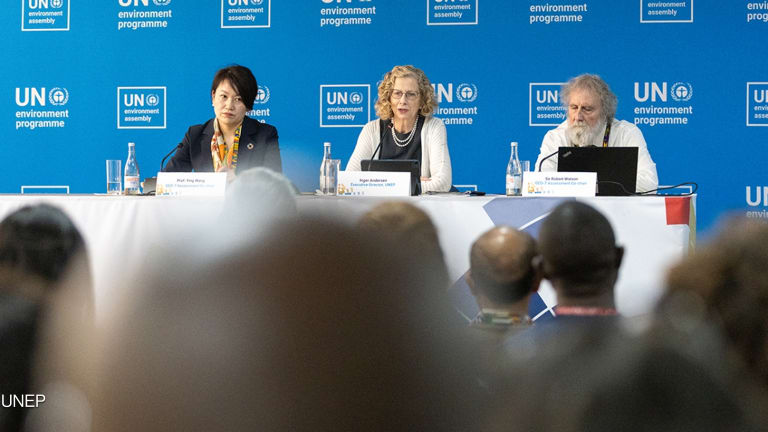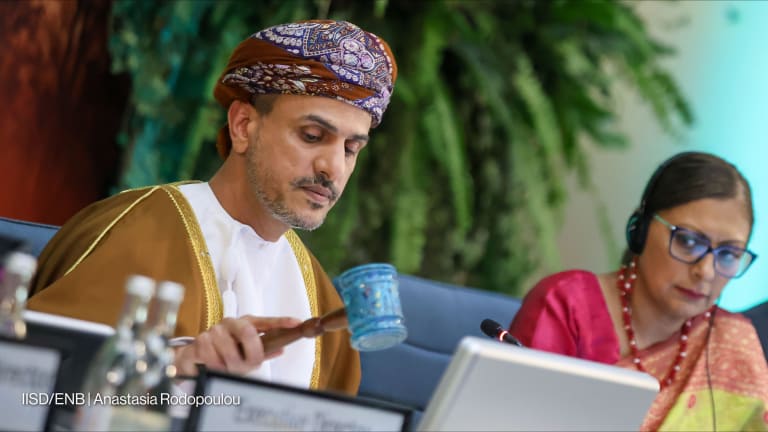What to expect at the 6th UN Environment Assembly: 4 issues to watch
Over 3,000 delegates will attend the sixth session of the United Nations Environment Assembly, or UNEA-6. Here’s what to watch.
The world’s highest environmental decision-making body’s biannual meeting kicks off later this month in Nairobi, Kenya, to address pressing and emerging environmental challenges facing the planet. The sixth session of the United Nations Environment Assembly, or UNEA-6, will take place from Feb. 26 to March 1, focusing on the interlinkages of three planetary environmental crises: climate change, biodiversity loss, and pollution. Held at the U.N. Environment Programme headquarters, it is expected to be attended by over 3,000 delegates, including over 70 ministers, intergovernmental organizations, the broader U.N. system, the scientific community, and the private sector, among others. UNEA-6 is part of development meetings held by the U.N. to set the global environmental agenda, providing policy guidance and defining member states’ responses to the emerging environmental challenges that are not usually addressed during climate negotiations. The assembly will focus on six key issues: mining, water, the global biodiversity framework, overuse of fertilizers, solar radiation modification, and reforming the international financial system and aligning it with sustainability, Inger Andersen, UNEP’s executive director, stated during an opening press conference. Twenty draft resolutions and two draft decisions have been submitted for discussion during the meeting. The resolutions will cover topics such as waste management; air pollution; land degradation; nature-based solutions; water, ocean, and seas; climate justice; and recovery in areas affected by armed conflict, Radhika Ochalik, director of governance affairs office at UNEP, explained during the press conference. UNEA-6 has placed heavy emphasis on cooperation, with an entire day dedicated to Multilateral Environmental Agreements. The objective of the day is to facilitate MEAs’ contributions to UNEA and to promote coherence between UNEA resolutions and the decisions of their governing bodies. “UNEA-6 will seek to drive, unite, inclusive multilateral action that addresses every strand of the triple planetary crisis as one indivisible challenge. UNEA-6 will not solve the world’s problems overnight. What it will do is unite nations under the banner of environmental action and focus minds and energies on key solutions of the crisis,” Andersen said. On the agenda Highlights on the agenda include a Youth Environment Assembly, which was held on Feb.17, as part of the lead-up to UNEA-6. Other main events outlined by the meeting’s program include the Climate and Clean Air Conference 2024, a Cities and Regions Summit, a Special Session of the U.N. Science-Policy Business Forum on the Environment, and the second annual executive meeting of the Quadripartite Collaboration on One Health. Here are four notable areas we are watching, that are part of, or glaringly absent from, the UNEA-6 process. 1. Plastic pollution The issue of plastic pollution will feature prominently during UNEA-6, raising hope among civil society that U.N. member states are on the brink of agreeing on an international, legally binding instrument on plastic pollution. Andersen confirmed this is at the final stages of negotiations to agree on a final text before the end of 2024. Discussions around plastics and a possible treaty will be opened through the Fourth Ministerial Meeting of the High Ambition Coalition to End Plastic Pollution, with a series of side events focusing on the issue. That has sunk well with environmental civil society groups, who are looking to UNEA-6 as a forum where the 193 U.N. member states can be lobbied to stop the production and use of plastics. Kiyimba Mugagga, the Uganda national coordinator of the Schools and Colleges Permaculture Programme, or SCOPE, whose organization is doing intensive plastic waste recycling in the country, said he was encouraged by the progress that was being made by global leaders to hammer out a plastic treaty. “The plastic treaty issue being on the agenda of the meeting is important because it is an instrument that will have laws binding governments to stop the production of dangerous plastics,” Mugagga explained. He added: “If we do not fight plastics from the policy level, it will be impossible for environmental groups to stop global corporate giants from producing and dumping them in poor communities.” 2. Fossil fuel regulation Given the outcome of the 29th U.N. climate summit, where countries agreed to a “transitioning away from fossil fuels,” some energy lobby groups expected UNEA-6 to be the forum that would take talks on a nonproliferation treaty of fossil fuels to the next level. Yet this does not appear to be on the UNEA-6 agenda, despite Andersen acknowledging the issue during a press conference. A treaty would help in finding a framework for a just transition from fossil fuels, according to Amos Wemanya, the senior adviser on energy at the think tank Powershift Africa. He explained to Devex that countries, especially those in Africa, are keen to transition from fossil fuels but their economies heavily depend on them, hence they need support to make the switch to renewable energy through a globally agreed framework. He cited the example of Nigeria, where communities living in poverty have not benefited from the exploitation of the country’s fossil fuels but are suffering the most from the effects of climate change. “As countries like Nigeria transition their economies to renewables they need to be funded. We need an international framework that ensures that,” Wemanya urged. 3. Conflict and climate change Sessions allocated for the business community and the private sector at UNEA-6 have NGOs hoping that investment in resources to fund humanitarian intervention for African communities devastated by conflict and climate change will be a key outcome of the meeting. According to Kunow Sheikh Abdi, Mercy Corps country director for Kenya, efforts to battle climate change in conflict-affected regions in Africa are being hampered by a lack of resources. It is impossible to scale up successful models that work in these areas without resources for adaptation, anticipatory action, early preparation for these communities, as well as mainstreaming climate actions. “There is an urgent need to increase financial investments in adaptation, particularly for the most vulnerable populations and those in fragile, conflict-affected countries, as well as a commitment to provide funding for the Loss and Damage Fund. This support is crucial to helping the poorest and most vulnerable communities devastated by climate disasters, who bear the least responsibility for climate change,” Abdi told Devex via email. 4. Geopolitics A sideshow to watch out for at UNEA-6 will be how global leaders respond to conversations about the at least 64 elections being held this year, especially on the issue of political commitments to battle climate change. Andersen pleaded with the electorate across the world to be mindful that the environment is a justice, future, and health issue when casting their votes. “We cannot trash our planet and then leave it to those who come after us. I hope when voters will go to vote they will take the future with them in their hands because when we vote we are not just voting for today, we are also voting for tomorrow,” Andersen said.
The world’s highest environmental decision-making body’s biannual meeting kicks off later this month in Nairobi, Kenya, to address pressing and emerging environmental challenges facing the planet.
The sixth session of the United Nations Environment Assembly, or UNEA-6, will take place from Feb. 26 to March 1, focusing on the interlinkages of three planetary environmental crises: climate change, biodiversity loss, and pollution. Held at the U.N. Environment Programme headquarters, it is expected to be attended by over 3,000 delegates, including over 70 ministers, intergovernmental organizations, the broader U.N. system, the scientific community, and the private sector, among others.
UNEA-6 is part of development meetings held by the U.N. to set the global environmental agenda, providing policy guidance and defining member states’ responses to the emerging environmental challenges that are not usually addressed during climate negotiations.
This story is forDevex Promembers
Unlock this story now with a 15-day free trial of Devex Pro.
With a Devex Pro subscription you'll get access to deeper analysis and exclusive insights from our reporters and analysts.
Start my free trialRequest a group subscription Printing articles to share with others is a breach of our terms and conditions and copyright policy. Please use the sharing options on the left side of the article. Devex Pro members may share up to 10 articles per month using the Pro share tool ( ).
David Njagi is a Kenya-based Devex Contributing Reporter with over 12 years’ experience in the field of journalism. He graduated from the Technical University of Kenya with a diploma in journalism and public relations. He has reported for local and international media outlets, such as the BBC Future Planet, Reuters AlertNet, allAfrica.com, Inter Press Service, Science and Development Network, Mongabay Reporting Network, and Women’s Media Center.








